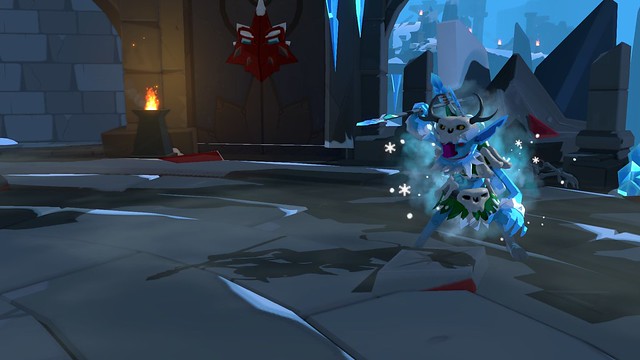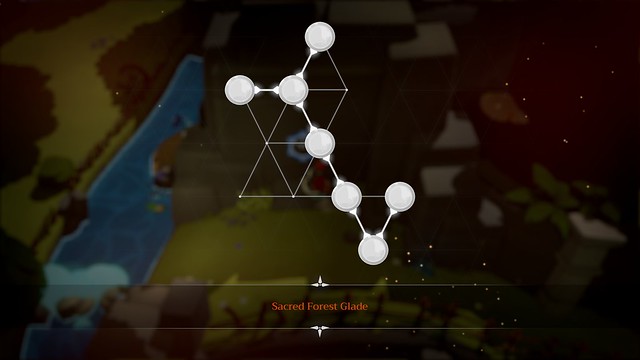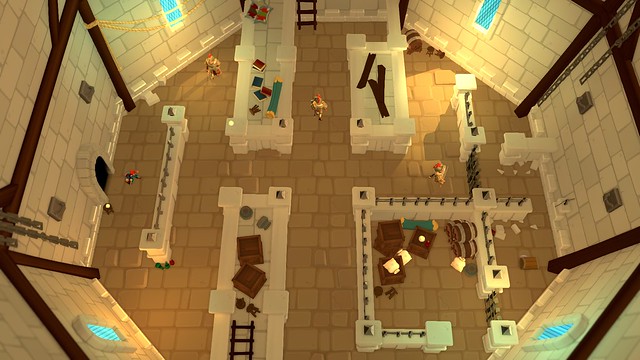
Push your spellcasting to the limit with a specially designed difficulty level.
I’m really excited to announce that we have developed an all-new mode called Archmage Mode for Mages of Mystralia in anticipation of our launch on August 22! It’s designed for hardcore gamers (The type of person who might be reading PlayStation.Blog!) to make sure that you’re challenged throughout the campaign.
In general, one of the hardest aspects of game design is nailing the difficulty curve. Ideally, you always want the game to be challenging but not too difficult. At the beginning, the game should be easy enough while the player develops the skills that are unique to the game. Over time, as the player has mastered those skills, the game should test them more and more. If the game is too difficult, it produces anxiety and frustration. Too easy, and the game is boring. Jesse Schell has a great diagram of this concept in his book The Art of Game Design:
The reason why this poses such a challenge for game designers is that it’s really difficult to put ourselves in a position of a new player who hasn’t yet mastered the skills. All of us at Borealys Games have played through Mages of Mystralia so many times that we could probably beat it blindfolded by now!
A good way to test the difficulty is through testers. We’ve brought in dozens of testers (Not to mention the hundreds of Kickstarter backers!) through the years and started to notice that we actually had two different categories of players — those who just wanted to play around with the spellcrafting system and enjoy the story, and those who really wanted to prove their mastery by facing a much harder challenge.
Archmage Mode was designed for that latter group. When we set about designing a specific mode for players who wanted a deeper challenge, we didn’t want to be lazy about it. It would have been easy to add more enemies, increase the damage they deal, and increase their HP. That would have slowed down some players — and maybe caused them to die more frequently than they otherwise would have, but it would be more grind than fun. It would be like making runners at a track meet sprint through molasses. About a year ago, the YouTuber Dunkey (of whom we’re all big fans) made a great video criticizing poorly designed difficulty levels. We wanted to avoid that. In essence, we wanted to make it almost an entirely different game experience for a very different audience.
So what’s new in Archmage Mode? First, we’ve added four new enemy types — one for each element — that are only found in this mode. These enemies not only deal more damage than typical enemies, they approach the player differently. They can add elemental effects to their attacks, and they anticipate your actions better.
In addition, there are optional puzzles sprinkled throughout the game, many of which have been ramped up in terms of complexity. Broadly speaking, there are two categories of puzzles in the game. The first one is door puzzles. In this puzzle type, you encounter a magical seal that you need to unlock by rearranging the different nodes so that they all connect to each other.
Another category of puzzle is one that tests your spellcrafting skills, as you need to design a spell to achieve a specific goal. As a relatively simple example, you may need to create a spell that will light three braziers simultaneously. In Archmage Mode, many of these puzzles are far more complex and will require players to use advanced techniques like nesting spells.
When we did our playtesting, most players self-selected into which mode they were more interested in trying. You should know that there’s no “best” way to play. Games should be fun, and if you feel like you want to experience a charming story and play around with spellcrafting, regular mode is for you. But if you really want the game to test your skills, we think Archmage Mode will be like mana from heaven. (See what I did there?)
We’re looking forward to hearing what everyone thinks when Mages of Mystralia launches on August 22!















Comments are closed.
7 Comments
Loading More Comments